The new series of Doctor Who debuts this weekend, but before it does, reviewer Tim Robins outlines the difficulties the show faces even before new adventures air, in an effort to clear the ground before he reviews them…

At time of writing, the new season of Doctor Who – the 13th of “New Who”, with the overall title, “Flux” has yet to begin. Even before it does, it faces numerous challenges, in terms of both reception and its future.
The Trailers
Before I look at wider issues facing the series, a word about those trailers for Flux, shown widely on TV and online, and in cinemas. Some have used an old trick to stir interest, appearing as a broadcast signal breaking through to warn audiences of bad things to come.
These trailers prompted a lot of speculation about the series among fans. For my part, I must admit to being bewildered by the lack of thought I felt had gone into them.
What hope, then for the series itself?
First, simply in terms of technical accuracy, the presentation was at odds with today’s transmission formats – a break-up of a digital signal is visibly a very different looking thing to an analogue signal. That in itself was jarring.
Then there’s the script. Whoever wrote The Doctor’s warning had what might kindly be called a “tin ear” for the English language. Apparently, the Doctor is suffering from something called “The Flux”, which, initially, I thought might be easily cured by a big bottle of Milk of Magnesia.
Then we are warned that the “Flux” is bringing with it (surely, bringing up?)… Sontarans! (for those new to Who, who are they?) Weeping Angels! (creatures who take the form, well some of them, of cemetery angels, which I found inexplicable when they first appeared in the drama).
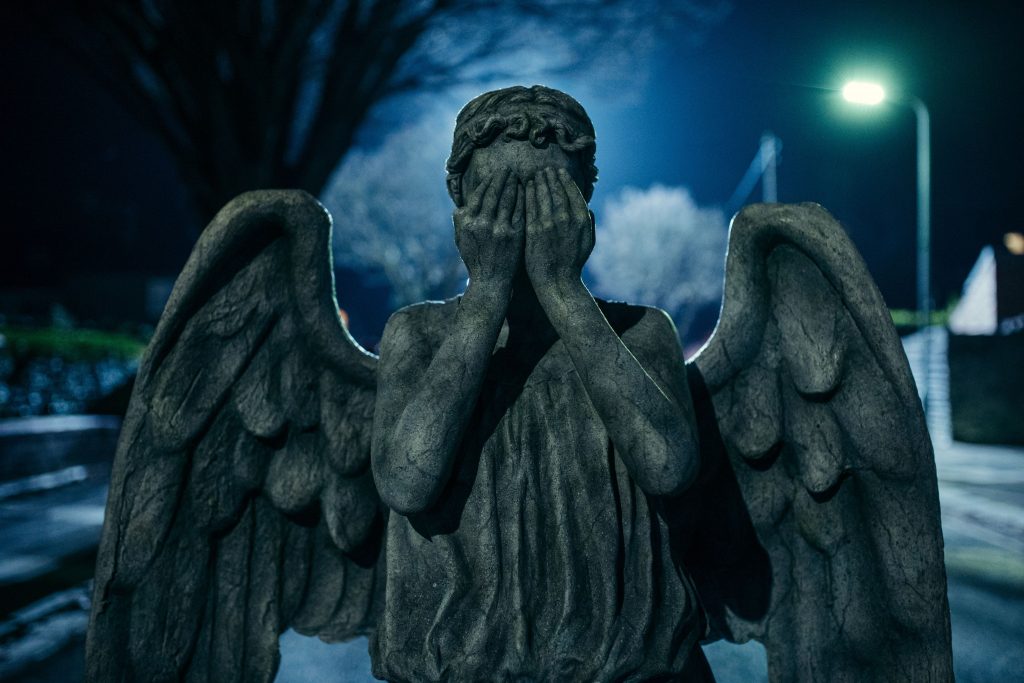
And we’re also in danger, it seems, from “creatures known as Ravagers”. What next, I wondered? “Creatures from prehistory wrongly called the Silurians”, or “Their cousins once stigmatised as ‘Sea Devils’ but who have now adopted that name as their own” or even “Spikey-headed robots, formally known by their Dominator masters as Quarks”?
There were other more straightforward trailers, of course, including one screened as part of The Graham Norton Show, for all the kids in his audience (hmm…). But it’s the “interrupted transmission” trailer that led the charge to promote the new series and, for me, is representative of some of the problems I fear have dogged Doctor Who for some years.
Problems not, I emphasise, entirely of the current production team’s making, either.
Spoilers! (And yes, that includes the return of Russell T. Davies)
You could also argue that despite brave attempts to avoid them, there have been a number of leaks, or “spoilers”, which may have marred some fans attempts to come at the new season anew. Not helped by a previous (and very apologetic) Doctor Who producer, Steven Moffat, from inadvertently revealing a spoiler themselves.
But the biggest ‘spoiler’ for this season has been the news that, soon, another former producer, Russell T. Davies, will be back making the show again, alongside Julie Gardner and Jane Tranter, who brought Doctor Who back from TV limbo in the 1990s. Perhaps of even more import is that going forward, like so many other TV shows today, Doctor Who will be a co-production from BBC Studios and Bad Wolf, a production company that is close to being acquired by Sony Pictures Television.
The timing of that announcement upset fans. Not because it presages the return of Russell T. Davies’ alleged “gay agenda” (sic), but because it has rather pulled the rug from under current series lead Jodie Whittaker and showrunner Chris Chibnall’s final season, and remaining specials, the latter to be broadcast next year.
On the other hand, the BBC might well have thought that the announcement of Russell T. Davies would excite interest in the series, although it’s clear the TV guide magazines, including Radio Times, still feel it has at least some pulling power in terms of sales.
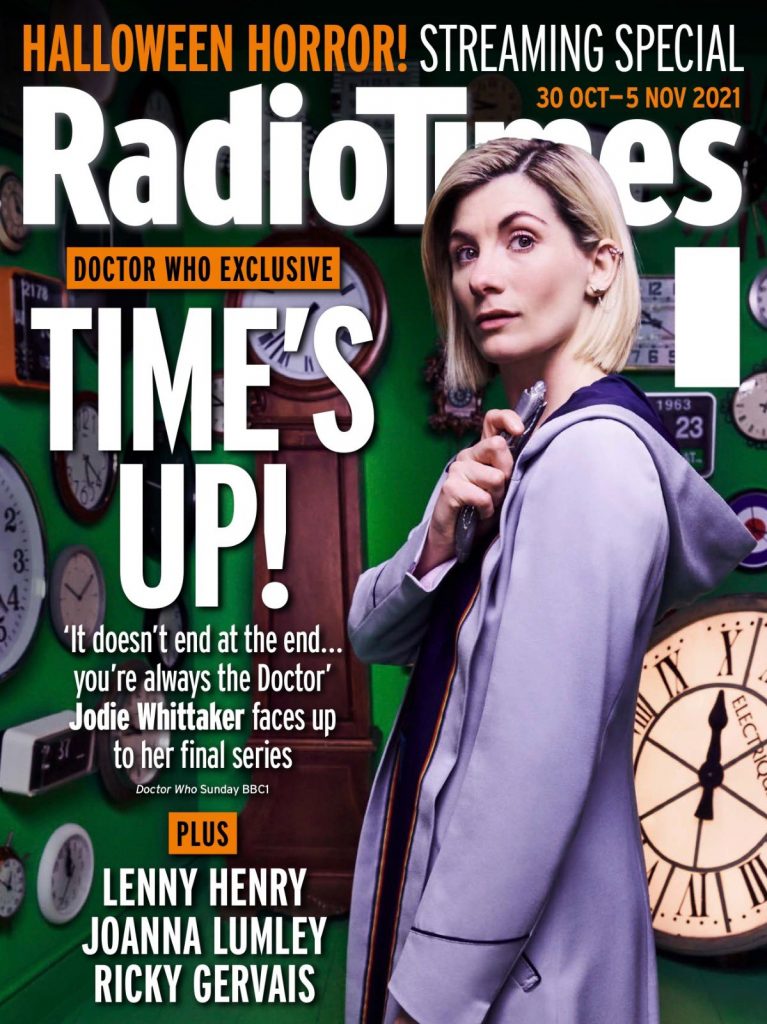
Doctor in Distress…
This isn’t a condemnation of Chibnall’s tenure as show-runner or Jodie Whittaker as the Doctor but, to be blunt, Doctor Who, as a “franchise”, is in difficulty, and the aim of this piece is to outline those difficulties, and so clear the ground before I review any of the actual episodes.
I’m not going to reflect on Chibnall’s era, or Whittaker’s Doctor, as that would be peremptory. I’m not going to speculate on what changes Russell T. Davies will bring, since I don’t have a crystal ball. I’m not interested in debates about women performers as the Doctor, diversity in the cast, or much about Doctor Who as the product of a public broadcaster. I’m not interested in ratings per se (Doctor Who is doing well in the UK, comparable to other shows), nor denying those areas where Whittaker has been a success (Blu-Ray and DVD sales, for example). But…
Doctor Who, the TV series, and Doctor Who, as a brand, is in trouble.
The Blame Game: You’re Looking in the Wrong Direction…

That trouble began with Steven Moffat’s term as show-runner, so forget dumping on Chibnall and Whittaker. You’re wrong.
I think it is fair to say that, over time, Moffat turned Doctor Who into a programme more general audiences were less enthusiatic about following than they were when the show-runner was Russell T. Davies. Then, the Christopher Eccleston and David Tennant stories were more grounded, more down to Earth and companions were relatable in terms of their personalities, interactions and everyday lives beyond their travels with The Doctor. They specifically weren’t a time fragmented enigma, nor a comedy robot.
Neither was the Doctor a mad man in a box nor a wannabe rockstar (cringe), nor your Dad. One of the strengths of the Russell T. Davies era, for me, was that it decisively moved the character away from a asexual man in a period costume encountering convoluted characters that had escaped from a panto. The Doctor Who of Hartnell, Troughton, Pertwee and Tom Baker was great in its day, but that day had gone. But Moffat didn’t seem to realise this, although I will say that I admired a lot of Moffat’s writing and ideas.
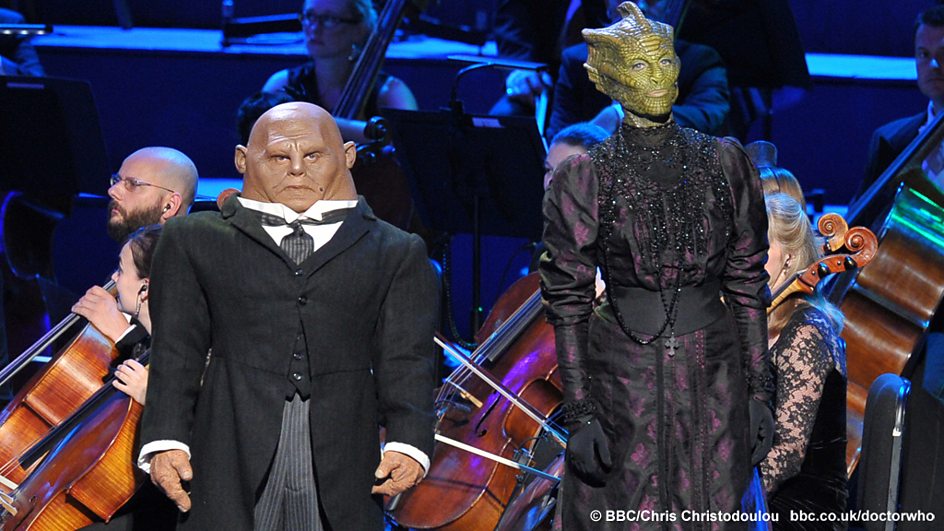
After Matt Smith left, I think it is fair to say that the BBC seems to have begun to question whether Doctor Who was now a show they wanted to make. There are several signs of this, including shifting the show around in the schedule and, albeit much later, cancelling events such as the concerts. Apparently a survey showed that they weren’t winning a wider audience for classical music, but really, organisations don’t start questioning things, and the BBC doesn’t use audience surveys, unless there is already deemed to be a problem.
In short, Doctor Who was losing whatever product champions it had in the organisation.
Ironically, while it appeared Moffat was putting Doctor Who second in his list of priorities, it was the success of his Sherlock Holmes that gave him enough clout to secure Capaldi a final season because, as hotly rumored at the time, the BBC were up for giving Doctor Who a rest.
Moffat wasn’t helped by the fact that he was making Doctor Who in the face of large budget cuts across BBC’s programme making. I understand those to be 30 per cent across his first three seasons. Those kind of budget cuts matter, because because to the outsider’s eye, it has often looked like the BBC just can’t afford to make Doctor Who, an impression reinforced with seasons broken up across different financial years.
Shorter and shorter seasons, for whatever reasons (also including the time it takes to make each episode) make the series harder to amass enough episodes to sell abroad. There’s no equivalence to the products of specific streaming services which are shorter in length; Doctor Who must sell to networks around the world. And in the UK, and elsewhere, shorter seasons make the show less ‘present’ on the screen, accompanied by less viewer interest and investment in the series, particularly among children. Which has added to several other problems.
Ratings: The Missing Element – Children
Doctor Who’s overall ratings may be fine in today’s splintered TV viewing environment, but in recent years, it has lost a key demographic central to ongoing success in its audience – children. This matters to the BBC, particularly as Doctor Who is still seen as family viewing – and that child audience was lost with the decision to make Peter Capaldi the Doctor.
It is no secret that the BBC did not want an older Doctor. Producer Steven Moffat may well have thought Capaldi would have been a wonderful nod to the Hartnell era, but his fannish interest was not echoed by young viewers.
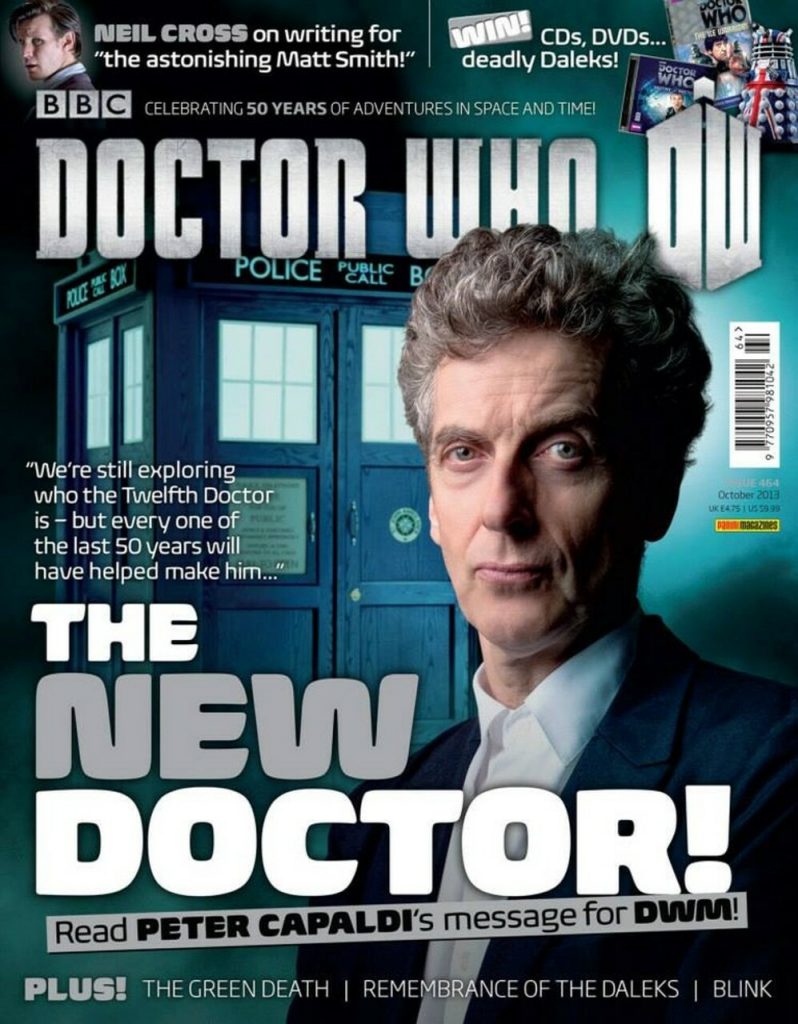
The other problem with casting Peter Capaldi as the Doctor was, to be brutally honest, how many children wanted a lunch box with Capaldi’s face on it? We live in a time where older, adult authority figures are not the stuff of heroism or heroism they once were. Grandfather figures had a place in the 1960s that they don’t enjoy now.
Matt Smith, on the other hand, was well received by youngsters. There was even a brief flurry of small children wearing fezzes (in the streets of Brighton at least) and, like David Tennant before him, Smith’s retro, vintage look was on trend. Moffat’s attempt to make Capaldi appeal to a younger age group by giving the Doctor Sonic dark glasses and a guitar just turned him into the Embarrassing Dad Doctor to Hartnell’s Crotchety Old Man.
Scheduling Issues – and a Merchandising Nightmare
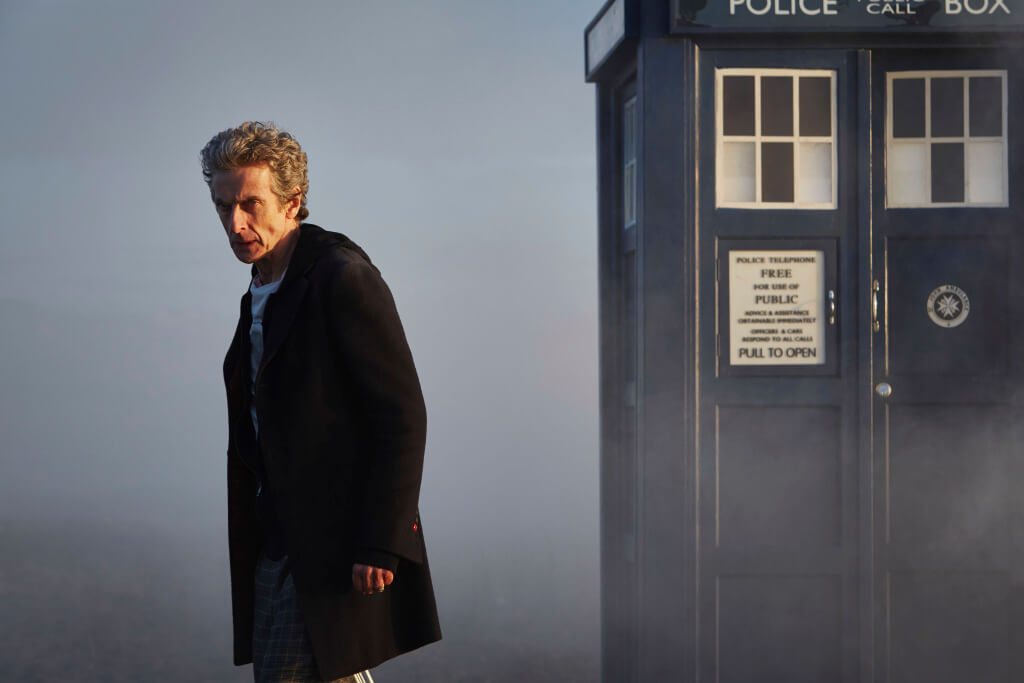
The rescheduling of Doctor Who to cross the nine o’clock watershed didn’t help, either. I could only laugh at the BBC’s justification that young fans would happily timeshift a programme that they were already losing interest in. To be blunt, Strictly Come Dancing makes more money for the BBC, is a ratings smash hit and Doctor Who just had to get out of the way. As long as this kind of reality show dominates Saturdays, Doctor Who will struggle to return to its natural timeslot.
Children also count because of merchandise sales. Moffat’s tenure saw a decrease, if not total collapse, of the toy market. Allegedly, the Paradigm Daleks were created on the behest of the BBC’s marketing arm, to try and syphon more money into the show. I have no idea if that worked. The new, smaller, scale character figures flew in the face of the toy collectors market, which was developing a taste for more accurate representations of licensed characters.
Although the show became harder to merchandise, maintream toy sales were not helped by the closure of Woolworth’s and Toys ‘R’ Us where Doctor Who toys were prominantly desplayed and extensively sold.
As for the children’s market, the show itself didn’t exactly have exciting monsters. Again there were budget issues there, but Moffat’s sitcom-ish, character-driven chamber pieces weren’t actually delivering the kind of exciting action adventures of the Eccleston/Tennant era. Russell T. Davies had a fine ear for slightly silly, child-friendly alien names and the characters to go with them.
Toy sales are only one part of what “new Who” became on its launch – a phenomena that spanned orchestral concerts, exhibitions, making-of documentaries and successful spin-offs. One by one, these fell by the wayside. Doctor Who just wasn’t a presence any more, on television, or in society. It especially wasn’t a presence for children. No more excited boys to be heard on the street explaining to their Mums or Dads how a Dalek could be destroyed by pushing it out of a plane.
A Battle Lost Before it Began?
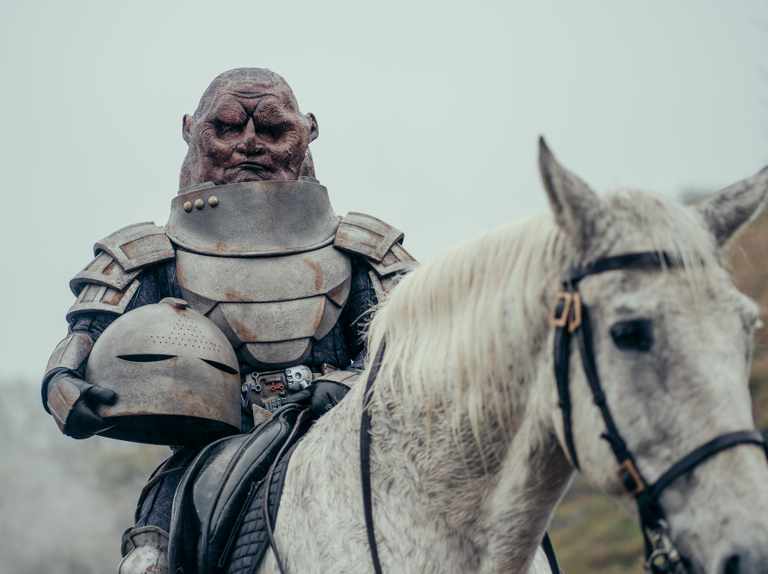
It was hoped that Chibnall could reverse all that. He tried, but he was climbing up a mountain pushing a huge boulder that was crumbling in his hands. Then there was COVID-19 and before that, the need to upgrade everything for a 4K image, a move that would impact everything from make-up to costume design, to set building to budget, and would help turn the production of the show into a desperately slow grind.
So there you have it. The above are challenges that the BBC is hoping Russell T. Davies will meet. And as much as I hate to admit it, his return is, for me, an admission of failure. One way or another, the BBC lost Doctor Who’s ‘glamour’, its excitement and its young audience. So the BBC has now had to go cap in hand to the former showrunner, to save Doctor Who’s future.
Will the series survive and, if so, what will be left of it? Time will tell, that time being some years in the future. Meanwhile, Sunday 31st October, 2021 is another day.
Tim Robins
• Doctor Who: Flux (aka series 13) will premiere on Sunday 31st October 2021 on BBC One in the UK. In the US, the show airs on BBC America, with series 1-12 available on HBO Max | Official Web Site: www.doctorwho.tv
• Doctor Who – Flux on Steelbook, Blu-Ray and DVD are available from 24th January 2022 (AmazonUK Affiliate Links)
• If you do want a Doctor Who lunchbox – and several options are available – then check them out here on the official Doctor Who store, or here on AmazonUK – including the Twelfth Doctor box, which is not listed on the official store
• Our guide to estimated modern Doctor Who comic sale is here from 2014, onwards
Web Links
These links are to fan reaction. Please note that the BBC does not formally recognise “fan” as an audience category. The BBC do not collect information on “fans”, their likes or dislikes.
Be aware the fans of these videos caution that spoilers – don’t watch if you want to go into “Flux” with no preconceptions!
The Confused Adipose
Speculation earlier this month, successfully guessing the air date – with no thanks to the official trailers…
George Sheard – Doctor Who Series 13: Everything We Know So Far
Stubagful – He Who Moans – Chibnall out, Russell back in – Obligatory Doctor Who News reaction
This contains strong swearing, especially about the way the production crew have been treated by announcing the return of producer Russell T. Davies in advance of the new series – “they deserve so much better than that”, Stu suggests
Doctor Who copyright BBC Studios
A freelance journalist and Doctor Who fanzine editor since 1978, Tim Robins has written on comics, films, books and TV programmes for a wide range of publications including Starburst, Interzone, Primetime and TV Guide.
His brief flirtation with comics includes ghost inking a 2000AD strip and co-writing a Doctor Who strip with Mike Collins. Since 1990 he worked at the University of Glamorgan where he was a Senior Lecturer in Cultural and Media Studies and the social sciences. Academically, he has published on the animation industry in Wales and approaches to social memory. He claims to be a card carrying member of the Politically Correct, a secret cadre bent on ruling the entire world and all human thought.
Categories: Doctor Who, downthetubes News, Features, Other Worlds, Reviews, Television

 In Review: Doctor Who – The Legend of Ruby Sunday/ The Empire of Death
In Review: Doctor Who – The Legend of Ruby Sunday/ The Empire of Death  In Review: Timeslides: The Doctor Who Artwork of Colin Howard
In Review: Timeslides: The Doctor Who Artwork of Colin Howard  In Review: The Illustrated Journey: A Visual Celebration of Doctor Who
In Review: The Illustrated Journey: A Visual Celebration of Doctor Who  Doctor Who: Worlds of Wonder Exhibition
Doctor Who: Worlds of Wonder Exhibition
I’ve always been surprised that Who has a following outside of the UK. When put against other shows (particularly the US) it looks like its made on shoestring budget, it always looks cheap and nasty. And that’s coming from someone who is a fan of the show.
UK shows have always had less money spent on them than U.S. ones. Sometimes it’s part of their charm for the Americans. Personally, as a DW fan from the beginning, I think part of the problem now is that the scripts are often incomprehensible. If you look at the old Classic DW episodes, there was a very strong plot-line. Nowadays, viewers either guess at what it all means, or just give up in despair.
One other observation: there is now no build-up of tension–the writers seem to think that today’s short-attention-span kids need everything in the first ten seconds. Imagine the writers now trying to script the movie ‘Psycho’!
I think that just shows that maybe the show isn’t for you anymore Jake. Most youngsters I know that watch it can easily understand what is going on.
Well, my wife & I were just discussing that unless the show bucks its ideas up, we may indeed call time on it–not something I’d do lightly though, after more than half a century. But back to your comments & veiled insults, do you feel it personally then, Jonno, if people disagree with your views on the prog?
Can I just step in here, as site owner? Folk are entitled to their views, and opinions are welcome. Doctor Who has presented a huge range of stories across the decades and I doubt that anyone could say they liked every single story. Unfortunately, as I’m sure many have you have experienced, when one person’s viewpoint differs to another, that can provoke not just debate, but insults and rudeness that, frankly, I feel are out of place, certainly here. Thanks